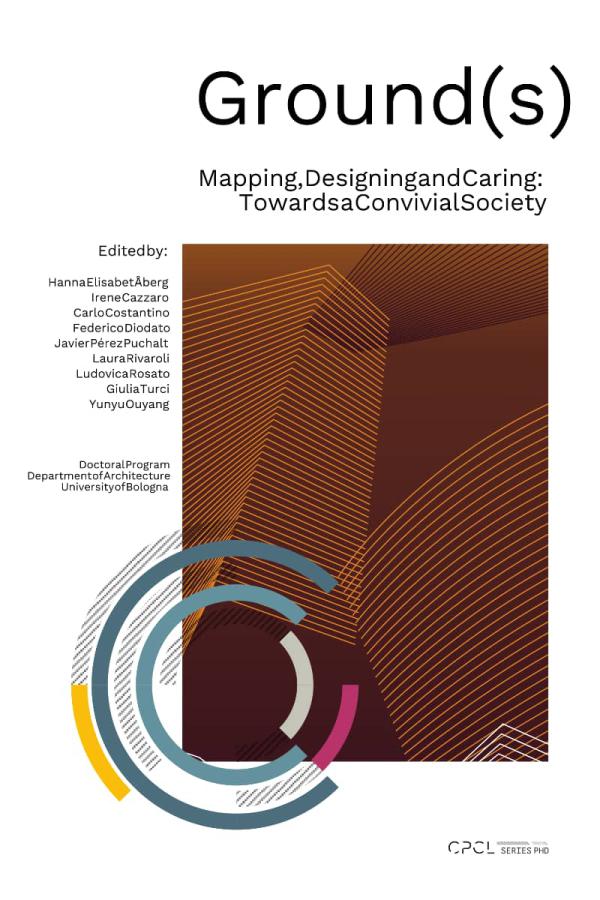Ground(s)
Mapping, Designing and Caring: Towards a Convivial Society
Downloads

Synopsis
The international conference Ground(s): Mapping, designing and caring: Towards a convivial society, held in December 2021 at the Department of Architecture of the University of Bologna, represents an intellectual activity, that transcends traditional academic boundaries.
Emerging from the idea of the candidates of the PhD 35th cycle in Architecture and Design Cultures - Unibo: Hanna Elisabet Åberg, Irene Cazzaro, Carlo Costantino, Federico Diodato, Javier Pérez Puchalt, Laura Rivaroli, Ludovica Rosato, Giulia Turci, and Yunyu Ouyan, this conference is one of the annual appointments, developed by PhD candidates to open a discussion on topics of interdisciplinary nature, useful for expanding knowledge and research goals, carried out within doctoral research and within the Department of Architecture of Unibo. The aim of these conferences is to highlight that contemporary challenges require a fundamentally integrated approach, fundamental paradigms of spatial understanding, moving far beyond conventional disciplinary constraints, showing a growing understanding that the complex problems of our era, as environmental degradation, social fragmentation, and technological disruption, cannot be addressed through narrow, specialized perspectives.
In this light, the concept of Ground(s) emerged as a rich, multidimensional metaphor that simultaneously encompasses physical, social, ecological, and philosophical terrains. It represents more than a mere physical surface; instead, it becomes a dynamic interface where human activities, technological innovations, ecological systems, and cultural practices continuously intersect and negotiate their relationships. This conceptualization challenges traditional notions of space as a static, passive background and instead proposes an active, and responsive understanding of spatial interaction.
This publication thus becomes more than a mere collection of academic papers. It represents the research for a new approach to understanding our environment, that recognizes the profound interconnectedness of human and non-human systems, that embraces complexity and uncertainty, and that proposes creative, adaptive strategies for addressing global challenges.
The contents emerging from this conference suggests that the most innovative solutions will arise not from disciplinary expertise, but from the fertile ground between disciplines, where different ways of knowing and seeing can dialogue, conflict, and ultimately generate new insights.
The University of Bologna’s PhD program in Architecture and Design Cultures has always pursued and promoted, while recognizing the identity of the specific disciplines, a model of interdisciplinary education, demonstrating how academic institutions can serve as laboratories for social and intellectual innovation. By creating spaces where architectural composition, urban studies, historical research, aesthetic theory, design practices, cultural heritage studies, and technological innovation can intersect, the program challenges traditional academic boundaries combining fundamentals and applied research in an interdisciplinary perspective. The research activity is therefore developed according to thematic areas that, given the nature of the PhD program, aim to develop studies in the field of architecture and design cultures as wide as possible.
The organization of annual doctoral conferences becomes a training activity for PhD students who collaboratively develop a cultural event that addresses project cultures as comprehensively as possible. The international conference Ground(s) - Mapping, designing and caring: Towards a convivial society, which follows those organized in previous years as: The Matter of Future Heritage; CHANCES. Practices, spaces and buildings in cities’ transformation; The Ecological Turn. Design, architecture, and aesthetics beyond "Anthropocene", once again focuses on topical matters trying to open a debate on contemporary issues.
The conference’s three primary tracks: Mapping, Designing, and Caring, provide a systematic framework for understanding and transforming our relationship with space and environment. Mapping goes beyond traditional cartographic practices, utilizing advanced technologies to reveal complex, often invisible networks of relationship and interaction. Designing transcends mere aesthetic or functional considerations, proposing adaptive, flexible approaches that anticipate future challenges and embrace systemic complexity. Caring introduces a profound ethical dimension, challenging anthropocentric perspectives and advocating for a more symbiotic relationship with our environments.
Particularly significant was the conference’s timing, emerging in the aftermath of the global COVID-19 pandemic, a moment that dramatically exposed the vulnerabilities of our existing social and spatial structures. The pandemic revealed the fragility of our interconnected systems while simultaneously highlighting the critical importance of community, adaptability, and resilience. By focusing on the concept of Conviviality, the conference envisioned a transformative reconfiguration of spatial and social dynamic, moving beyond isolation and competition toward more collaborative, supportive modes of coexistence.
Keynote speakers invited by PhD candidates at the Ground(s) conference brought extraordinary depth and diversity to the discussion: Paola Viganò from the École Polytechnique Fédérale de Lausanne (Switzerland) and Università IUAV di Venezia (Italy), with her cutting-edge research in urban planning, offered insights into territorial design that challenge conventional urban development models; Roberto Scopigno from the Institute of Information Science and Technology “Alessandro Faedo” (ISTI), Italian National Research Council, demonstrated his expertise in digital humanities and how technological innovation can transform our understanding of spatial and cultural landscapes; Beatrice Lampariello from the Université Catholique de Louvain (Belgium) provided critical perspectives on global spatial dynamics through her comparative studies on radical architecture; John Martin from the University of Plymouth (UK) illuminated the intricate relationships between design, culture, and social transformation through his research.
In essence, the Ground(s) conference and its resulting publication move beyond established academic discourse. The work presents a provocative invitation to reimagine spatial, environmental, and interpersonal relationships, challenging conventional perspectives by embracing complexity, cultivating systemic empathy, and proposing more responsive, resilient, and collaborative conceptual frameworks for future design.





